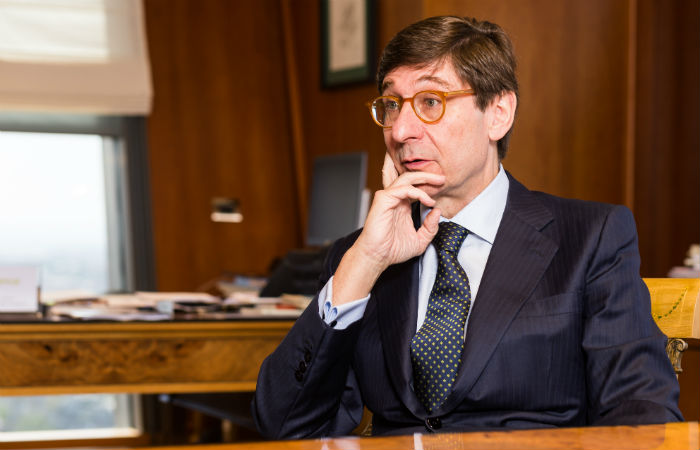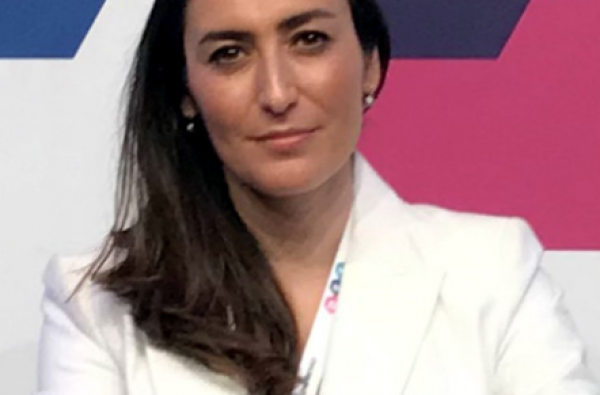Bankia's president, José Ignacio Goirigolzarri, talks about technological innovation as an obsession with customer satisfaction. But given that users have different levels and needs for digitalization, he bets on different relationships and processes depending on their demand and their digital culture.
The 35th President of the United States, John F. Kennedy, is credited with a phrase that could well come from the mouth of Bankia's current president, José Ignacio Goirigolzarri: "In times of crisis, be aware of the danger, but realize the opportunity.
His vision is to turn the client into Bankia's obsession, the fintech into allies and the workers into brand ambassadors. And although he believes that, in the field of processes, digitization should be maximum, he is committed to human treatment for certain procedures and is convinced that in five years time there will still be physical bank branches, although they will be very different from those of today.
Almost ten years after the crisis, we are in the midst of restructuring. What is the current situation of the financial system?
The financial system has many challenges. In addition to more conjunctural things like interest rates, there is a tremendous change in regulation that affects our business models. But the biggest challenge we have is to respond to the change in customer habits that is causing the technological transformation.
In the world of processes, there is no discussion, you have to try to reach the highest level of digitization and data. We started working on that in 2014. We have redefined all our processes.
But the most complex thing is the interaction with customers. The problem is that different customers have radically different behaviors that change over time, and you have to give them all an extraordinary service. I think that's the most complex thing, if you go too fast, the customers don't follow you; but if you go too slow, they go away.
Has Bankia found a balance between the most digitized and the most traditional customers?
Customers are increasingly using technological tools, it's quite impressive. 22% of customers who have bought a product from Bankia have done so through digital channels. But at the same time, we have 40% of customers who go to the office and the cashier. 80% of users who use other channels, who use the app, but who go to the office at least once a semester. Combining all these elements is what gives emotion to the challenges ahead.
The first thing you have to do is evolve with your customers. The second thing is to work on a trial and error basis, if you don't do trial and error, you don't learn. Thirdly, give yourself a very flexible structure that allows you to react very quickly to changes in the market.
If you segment customers according to their value and their digitization, each distribution channel involves fixed investments. The most complex thing is to move people from one place to another. If a customer has a lot of value and little digitization, you serve him in an office with a manager. If a client is closely linked and very digitalized, we have managers in a project called 'Connect with your expert' that already has more than 600,000 clients. If the client is transactional and not very digital, for him we have almost 200 agile offices. Finally, if it is digital and has little linkage, we have an engine to relate to customers, depending on their profiles and the time they have not been contacted, and so on.
What value do customers attach to personalised treatment when digital tools become relevant in their relationship with the bank?
Customer satisfaction levels are extraordinarily high when they have a proactive reference manager. When you want to assign experts to personalized treatment and offer a powerful platform for the rest, you realize that not everyone is digitized. Normally, as you approach these transactional zones, the levels of digitization are lower.
Banking has a limited ability to influence society. A few years ago it became fashionable that the bank was very retail and you had to have fun offices, like Zara, and I thought: "Don't tell me stories". I don't know anyone who on a Saturday morning says, "I'm on pension plans today. A bank is not an agent of culture, you have a capacity of your own and it is much more important to understand what society says and respond to that.
Is it perhaps something that traditional banks should learn from fintech?
Fintech has changed a lot in recent years. At first, technologically very powerful fintech underestimated the ability to generate critical masses of customers; and banks despised innovation and did not see them as a powerful competitor. But things have changed and for us, being in a relationship with start-ups and fintech is key and has extraordinary value.
We have the Innovation Lab with Insomnia in Valencia [Spain]. It's a concept I like a lot, it's not intrusive and I think it's a win-win. We don't necessarily have to invest, we can be clients. I've always been very afraid that a big company will buy a big stake in a start-up, because it kills it. The dynamics are so different that no matter how much you want someone to take care of them, the organisation, the phagocytes and the people who work at fintech change their mentality, they become bankrupt, but this is not going to become bankrupt. In our Valencian experience we do it with a very clear vision: these are our concerns, how can we solve them?

And what are these concerns?
In 2013 there was the restructuring and we had to close offices, we reduced our staff by more than 4,000 people, it was very hard. Until the second quarter of 2014, we couldn't think about transforming the bank. So we launched a transformation committee, because it was necessary to broaden the strategic vision, for people to have cross-sectional knowledge and to open the windows to new ideas.
We are now in the fourth mutation of objectives of the transformation committee, which we launched in April 2018. We have defined six working groups and they all have to do with multichannel and digitization: the first has a global vision that is the distribution channel; the second, although it seems a contradiction focuses on digital channels, customer experience, increasing the number of digital customers; the third is privacy, although it may be surprising. Fourthly, there is the digitisation of processes; fifthly, internal culture. We have a very defined culture, but there are elements that have to incorporate digital parts. Sixthly, external positioning. We believe that we are at a sufficiently mature level to look at external positioning within our will to be fast followers. We didn't want to be pioneers and we couldn't be. For an entity like Bankia, being followers is probably absolutely necessary and if you are fast, which we are, it really gives you a very notable competitive advantage.
We have no problem incorporating something that is working for others. But you have to have two things: intellectual humility, which is difficult to maintain, and speed. What you do have to do is to implement fast and in the fast implementation, I think we do it well.
I said a moment ago that one of the obsessions is the assessment of customers and one of the challenges, privacy. How do you address the digital privacy of customers?
Our first approach to the RGPD was negative, we thought: "What a mess". But we immediately turned it around and came to the conclusion that we were talking about something very important to our customers. It's not easy to understand what privacy is. That's why we try to get customers to tell us what they want us to do with their data. I don't think they are aware of the value of their data today. It's going to take some time for people to visualize it, but there's a business model that's going to exist around data.
If data management changes, do bank branches have an expiration date?
Undoubtedly, in the next five years (because to think beyond seems to me something very difficult) we will continue to have offices. They are not going to be the same as now, they will go through a very clear transformation process and there will probably be less. They will become a consultancy or recruitment center for those who prefer human contact, which I believe will be the majority in five years' time.
How do Bankia professionals adapt to innovation?
They are profiles that must continually adapt to the client, technological evolution and talent management. We've already experienced changes in technology and customer habits, but in terms of talent management, we haven't seen significant changes in the last two decades. We work with the same systems for attracting, retaining and motivating talent. Ten years from now it is going to affect us because the teams are going to be different, the motivation elements are going to be different.
Incorporating new teams and lines of work requires a profound organisational change. How was this need to innovate transmitted to the board of directors and how has this structure changed?
There is a tendency to have people with very different experiences in the council. This contributes more because the council will see reality from different prisms. But although this is the theory, very little is applied. Now there is an obvious element of application in gender issues and it will come in age issues, a point on which not enough emphasis is yet being put.
Normally people prefer to be on advisory boards, but it's not easy to have a good one. If you really believe that there is value there, you have to propose some important compromises of availability. I'm often called headhunter to see if I want to go to the councils, but I can't think of it. I have a full-time job, I can only do this. That's why it's not easy to have a relevant and powerful advisory council. In the end, I prefer to have a consultant.
What transformation strategy is Bankia going to choose in such an accelerated period?
In our sector, we are still restructuring. There are not going to be the brutal declines of recent years, but the pigtails are missing. And in this process, you have to have a tremendously innovative vision due to changes in customer habits and you have to manage very rigorously. Not only is it about giving different answers, but it also involves very different ways of directing. I think that's very funny.
What do you think of the boom and promises of crypto coins?
In an increasingly technological environment, I am convinced that it is people who see the difference between excellent banks and mediocre banks. We are very curious about Bitcoin, and we are convinced that, in the medium term, it will be disruptive. But here we have a position of fast followers, we are not going to be the ones to invent the miracle of Bitcoin.
Finally, how does Bankia imagine itself in five years?
As a very competitive entity, based on the obsession to understand what customers want. An entity that gains its independence with a profitability above its own funds. And behind all this, there are committed people who feel that the project they are working on is theirs.
By Olga Rodríguez



